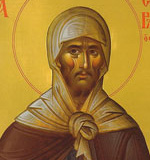Saint of the Day Online - St Ephraem the Syrian
Saint of the Day for Friday, June 9th, 2017
09-06-2017
Saint Name: St Ephraem the Syrian
Place: Nisibis, Turkey
Birth: 306
Death: 9 June 373
St Ephraem The Syrian was born in 306 and was a Syriac Christian deacon and a prolific Syriac-language hymnographer and theologian of the 4th century. He is especially beloved in the Syriac Orthodox Church and counted as a Venerable Father (i.e., a sainted Monk) in Eastern Orthodoxy. His feast day is celebrated on 28 January and on the Saturday of the Venerable Fathers. He has been declared a Doctor of the Church in Roman Catholicism in 1920.
Ephrem served as a teacher, and possibly deacon, under four bishops of Nisibis, Jacob, Babu, Vologeses, and Abraham. The first three he describes in the hymn quoted above written while Vologeses was still alive. As the verse states, Ephrem did not live in easy times in Nisibis.
"I have chanced upon weeds, my brothers, That wear the color of wheat, To choke the good seed."
According to tradition, Ephrem began to write hymns in order to counteract the heresies that were rampant at that time. For those who think of hymns simply as the song at the end of Mass that keeps us from leaving the church early, it may come as a surprise that Ephrem and others recognized and developed the power of music to get their points across. Tradition tells us that Ephrem heard the heretical ideas put into song first and in order to counteract them made up his own hymns. In the one below, his target is a Syrian heretic Bardesan who denied the truth of the Resurrection.
Ephrem's home was in physical as well as spiritual danger. Nisibis, a target of Shapur II, the King of Persia, was besieged by him three times. During the third siege in 350, Shapur's engineers turned the river out of its course in order to flood the city as Ephrem describes.
Tradition tells us that during the famine that hit Edessa in 372, Ephrem was horrified to learn that some citizens were hoarding food. When he confronted them, he received the age-old excuse that they couldn't find a fairway or honest person to distribute the food. Ephrem immediately volunteered himself and it is a sign of how respected he was that no one was able to argue with this choice. He and his helpers worked diligently to get food to the needy in the city and the surrounding area.
The famine ended in a year of abundant harvest the following year and Ephrem died shortly thereafter, as we are told, at an advanced age. We do not know the exact date or year of his death but June 9, 373 is accepted by many. Ephrem relates in his dying testament a childhood vision of his life that he gloriously fulfilled.